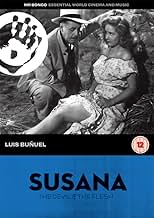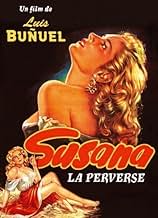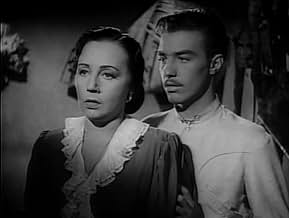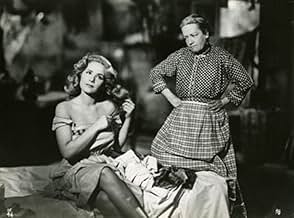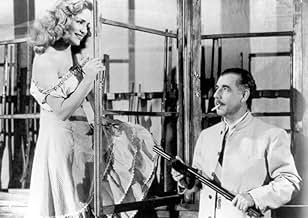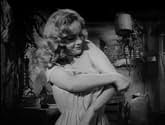VALUTAZIONE IMDb
7,2/10
2395
LA TUA VALUTAZIONE
Una giovane donna fugge dal riformatorio e rimane nella casa di una famiglia ricca e rispettabile. A poco a poco, provoca discordie tra i membri della famiglia fino a quando non torna in car... Leggi tuttoUna giovane donna fugge dal riformatorio e rimane nella casa di una famiglia ricca e rispettabile. A poco a poco, provoca discordie tra i membri della famiglia fino a quando non torna in carcere.Una giovane donna fugge dal riformatorio e rimane nella casa di una famiglia ricca e rispettabile. A poco a poco, provoca discordie tra i membri della famiglia fino a quando non torna in carcere.
- Regia
- Sceneggiatura
- Star
- Premi
- 1 candidatura in totale
Jesús García
- Empleado de Guadalupe
- (non citato nei titoli originali)
Leonor Gómez
- Empleada de Guadalupe
- (non citato nei titoli originali)
Recensioni in evidenza
For years I have had a poster for this film on my wall but not until now have I ever seen it. It may have been included in a season at the National Film Theatre many years ago when I know I saw, Ascent to Heaven, but not this one. Even on my poster, Rosita Quintana looks alluring, but not quite as alluring as she is in this, simple yet effective, little known melodrama. The camera-work is marvellous with all manner of angles and shades of black and despite the predictability of the disruption this 'fallen woman' will precipitate, there are plenty of Bunuelian touches. I agree with others that the happy ending is probably nothing of the sort. Even Mexicans don't shrug off a passionate intrusion into their life that easily. The family is surely doomed as soon as the father takes a shine to the delicious snake in their midst.
Susana (1951)
** 1/2 (out of 4)
Bunuel's remake of the 1929 American film The Squall centers on Susana (Rosita Quintana), a mentally unstable woman, who escaped from a reformatory and gets shelter from a kind and caring family. Pretty soon Susana is turning on the sexuality and starts to make the family turn against one another. The original movie is perhaps the worst Hollywood film I've seen from that era so it didn't take too much for this movie to pace it up. With that said, I think overall this is a pretty disappointing film from the director but I'm really not sure if he could have done anything different to make it better. To me, this story just doesn't work because it's just so over dramatic that you can't help but role you eyes at all the "tragedy" that befalls the people around Susana. The only thing this movie tells you that men are dumb and can be changed due to a woman's sexuality. This really isn't too dramatic and in the end the movie begins to drag. Another problem I had with the film is that the characters were all pretty annoying and that includes the old aunt who is constantly screaming religious sayings. I'm not sure if Bunuel made her so over the top for laughs or if this was just his way to go against Christians. Even with all that said this is still a beautiful film to look at with some great cinematography. The performances are also good but I was expecting better considering the director. Quintana is great and really steals the film as she plays the innocent virgin to trick the family very well and on the blink of a dime she can turn into the slut. Fernando Soler is also very good as the head man of the home.
** 1/2 (out of 4)
Bunuel's remake of the 1929 American film The Squall centers on Susana (Rosita Quintana), a mentally unstable woman, who escaped from a reformatory and gets shelter from a kind and caring family. Pretty soon Susana is turning on the sexuality and starts to make the family turn against one another. The original movie is perhaps the worst Hollywood film I've seen from that era so it didn't take too much for this movie to pace it up. With that said, I think overall this is a pretty disappointing film from the director but I'm really not sure if he could have done anything different to make it better. To me, this story just doesn't work because it's just so over dramatic that you can't help but role you eyes at all the "tragedy" that befalls the people around Susana. The only thing this movie tells you that men are dumb and can be changed due to a woman's sexuality. This really isn't too dramatic and in the end the movie begins to drag. Another problem I had with the film is that the characters were all pretty annoying and that includes the old aunt who is constantly screaming religious sayings. I'm not sure if Bunuel made her so over the top for laughs or if this was just his way to go against Christians. Even with all that said this is still a beautiful film to look at with some great cinematography. The performances are also good but I was expecting better considering the director. Quintana is great and really steals the film as she plays the innocent virgin to trick the family very well and on the blink of a dime she can turn into the slut. Fernando Soler is also very good as the head man of the home.
This Bunuel film is based on a story written by a certain Manuel Reachi (who incidentally, like the director Bunuel, was born in Spain and died in Mexico). The film indirectly (and in some ways directly) glorifies the pious Christian faithful--here personified by the lady of the house and her chief maid who can spot "the devil" before the others do and is ready to drive it out as Jesus did in the Bible. This is a definite departure for Bunuel, who has never really shown a true Christian point of view in his films (except in Nazarin) but only chose to ridicule often than respect it.
The film is also a major departure for actor Fernando Soler playing the role of the rich landowner who gives a tepid performance compared to the one he gave in the other Bunuel film "The Great Madcap" (1949) made 2 years before this film.
The film is also a major departure for actor Fernando Soler playing the role of the rich landowner who gives a tepid performance compared to the one he gave in the other Bunuel film "The Great Madcap" (1949) made 2 years before this film.
Susana is a fallen girl. At the beginning we see her in a reformatory, but the reasons that brought her there remain in the dark. We just find out that she has learned nothing new in the two years she has spent there and that she behaves in the same unruly and rebellious way like when she was first admitted to the place.
She is brought into a dark and sinister cave which is teeming with rats and spiders. We know nothing about the reasons for this punishment and we can't avoid feeling sorry for her: Whatever she might have done, it does not justify an inhuman treatment such as this.
Susana is religious, and the god she calls on is kind and generous. So the miracle happens, the bars of the prison cell at which she is rattling suddenly give way and she succeeds in escaping into a night full of darkness and relentless rain.
She even can make it into paradise: A landowner's family takes her in, after she has told them a pack of lies. She is allowed to work as a maid and gains the confidence and the affection of the mother, while the father at first has a disapproving attitude towards her.
But the family's son and the steward live on the estate, too, and they don't fail to notice Susana's outstanding physical attraction. As the girl also knows how to place her charms, they both fall victim to her.
Susana, however, does not seem capable of developing any true feelings. Life is just a villainous game for her in which the rules are set by herself. The aim is to destroy the well established order. When finally even the landowner succumbs to the lure of love the initial situation becomes reversed and nothing stays the same: the mother turns into an enraged enemy, while father and son become rivals and the steward is dismissed.
It is then the latter who sets the decisive ball rolling which leads once more to a reversal of the circumstances: He finally makes use of his knowledge of Susana's escape from the reformatory, which up to now he kept to himself in order to increase his chances of winning Susana's favor, and Susana, however fiercely she may be defending herself, cannot avoid being arrested.
The game is lost, and, as it often happens in a melodrama, it is the refused lover, who makes it break down. In the end, the episode with Susana means nothing more than the memory of a nightmare for the landowner's family. And, after the re-establishment of the initial situation, the characters cannot help asking themselves if everything has really happened.
The attentive spectator will come to a different conclusion. He will notice the fundamental fragility of an order that is well established only in appearance. And he will not be able to avoid drawing a frightful parallel to his own life, in which nothing is secure and reliable either.
She is brought into a dark and sinister cave which is teeming with rats and spiders. We know nothing about the reasons for this punishment and we can't avoid feeling sorry for her: Whatever she might have done, it does not justify an inhuman treatment such as this.
Susana is religious, and the god she calls on is kind and generous. So the miracle happens, the bars of the prison cell at which she is rattling suddenly give way and she succeeds in escaping into a night full of darkness and relentless rain.
She even can make it into paradise: A landowner's family takes her in, after she has told them a pack of lies. She is allowed to work as a maid and gains the confidence and the affection of the mother, while the father at first has a disapproving attitude towards her.
But the family's son and the steward live on the estate, too, and they don't fail to notice Susana's outstanding physical attraction. As the girl also knows how to place her charms, they both fall victim to her.
Susana, however, does not seem capable of developing any true feelings. Life is just a villainous game for her in which the rules are set by herself. The aim is to destroy the well established order. When finally even the landowner succumbs to the lure of love the initial situation becomes reversed and nothing stays the same: the mother turns into an enraged enemy, while father and son become rivals and the steward is dismissed.
It is then the latter who sets the decisive ball rolling which leads once more to a reversal of the circumstances: He finally makes use of his knowledge of Susana's escape from the reformatory, which up to now he kept to himself in order to increase his chances of winning Susana's favor, and Susana, however fiercely she may be defending herself, cannot avoid being arrested.
The game is lost, and, as it often happens in a melodrama, it is the refused lover, who makes it break down. In the end, the episode with Susana means nothing more than the memory of a nightmare for the landowner's family. And, after the re-establishment of the initial situation, the characters cannot help asking themselves if everything has really happened.
The attentive spectator will come to a different conclusion. He will notice the fundamental fragility of an order that is well established only in appearance. And he will not be able to avoid drawing a frightful parallel to his own life, in which nothing is secure and reliable either.
This film, judging by some of the reviews on this page, seems to have a provocative effect: one person seems to feel that Susana is evil incarnate and should have been killed. Perhaps that's the point: Bunuel may very well have meant her to be a caricature of the "bad girl." While she uses her sexuality as a weapon, she is merely provoking desires that were always there. The family she inserts herself into is an apparently happy one, and perhaps itself a stereotype, with feelings under the surface waiting to escape, just as Susana herself is an escapee. Her seduction technique is itself pointedly obvious, and Bunuel may very well have been telling something of a joke with this film, neither his best nor worst. And the actress who plays Susana does have nice shoulders.
Lo sapevi?
I più visti
Accedi per valutare e creare un elenco di titoli salvati per ottenere consigli personalizzati
- How long is Susana?Powered by Alexa
Dettagli
- Data di uscita
- Paese di origine
- Sito ufficiale
- Lingua
- Celebre anche come
- Susana
- Luoghi delle riprese
- Aziende produttrici
- Vedi altri crediti dell’azienda su IMDbPro
- Tempo di esecuzione
- 1h 26min(86 min)
- Colore
- Proporzioni
- 1.37 : 1
Contribuisci a questa pagina
Suggerisci una modifica o aggiungi i contenuti mancanti

